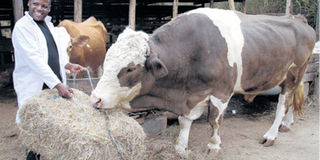Here’s how to catch veterinary quacks risking your animal’s life

A worker feeds Fleckvieh breed cows at a farm in Karen. FILE PHOTO |
What you need to know:
- After insemination, farmers should insist on retaining the straw until the cow calves.
- In 1990s when the World Bank introduced Structural Adjustment Programmes (SAPs) to turn around the economy, the government lost control of a number of sectors. Veterinary was one of them.
- Most farmers are now having a problem differentiating between a professional and a quack because everyone who knows a thing or two about animal health calls himself a veterinary doctor, which is dangerous for farmers.
The livestock sector faces many challenges that have stifled its performance. A major problems is the proliferation of unqualified veterinary officers. Dr Odhiambo Godia, the Kenya Veterinary Board CEO, spoke to Vincent Achuka about the issue.
Veterinary services remain out of reach of many farmers, especially in rural areas. What is the problem?
The officers certainly are not enough, but the challenge right now is not the numbers, but the distribution. Most of the vets are concentrated in areas where there is vibrant dairy farming. On the contrary, in pastoralist areas, the numbers are very low because of the perception that their animals are hardy.
Veterinary services are now devolved, thus county governments must ensure they have enough officers. Our estimation is that every year, 1,000 students graduate in different veterinary fields. This means there is enough manpower. We have proposed to the county governments to offer the students internship once they graduate, the way it happens in medicine.
It has become difficult for farmers to differentiate between quacks and qualified veterinary officers. How can they overcome the challenge?
Currently, we have 6,534 registered professionals in four different categories namely veterinary surgeon (degree holder) and veterinary technicians with degrees, diplomas and certificates. All those who have registered with us must have our identification cards. Farmers must ask anyone who claims to be a veterinary officer to show them the cards. This applies even to people who perform artificial insemination.
Some cows do not calve even after being served several times. Farmers are blaming this on quacks.
It all depends on the time it is served, which should not be later than 18 hours after it goes on heat. After this, the chances are very low. The cow can also have ovarian cysts, but a professional inseminator should be able to identify this and tell the farmer.
After insemination, farmers should insist on retaining the straw until the cow calves. The straw has details about the semen that has been used and its origin.
This will provide proof in case they have been duped. Most importantly, the cow should not be served by the same person twice and it does not get pregnant without a reason being given. If this happens, the farmer should seek redress through us.
You published recently names of academic institutions that are allowed to offer veterinary courses. Does it mean the profession is infiltrated by quacks and how is that affecting the industry?
In 1990s when the World Bank introduced Structural Adjustment Programmes (SAPs) to turn around the economy, the government lost control of a number of sectors. Veterinary was one of them.
Before that, all the professionals in the sector were employed and trained by the government, but after SAPs, this went to the private sector, giving room for quacks. Most farmers are now having a problem differentiating between a professional and a quack because everyone who knows a thing or two about animal health calls himself a veterinary doctor, which is dangerous for farmers.
So what are you doing about that?
Our officers have engaged the unaccredited institutions since June last year to apply for inspection as required by the Veterinary Surgeons and Veterinary Para-professionals Act. They have until December to do so, but the law is clear that if the institution is not accredited, we can’t register their graduates to practice.
We are also cracking down on the quacks. On Monday, a man who was masquerading as a veterinary doctor was charged in a Mombasa court.
The government was involved in offering extension, insemination and cattle dip services until 1990s. Shall this ever happen again?
The cattle dips were handed over to the communities. If they are not working, the communities should seek technical assistance from the county officials.
These services are now under county governments.
There is rise in imported semen. Does this mean semen from local breeders is of poor quality?
Not really. Kenyans have a notion that anything coming from abroad is superior. This has led to farmers being duped. The government has in its bank enough semen that is as superior as that which is imported.





